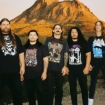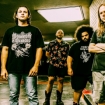Our Place of Worship Is Silence are not interested in aesthetics. They're not interested in fashion. They're not interested in how many skulls your band's logo might have in it. All they care about is making death metal like you've never heard before. "The death-metal scene has definitely been oversaturated in the last few years with a lot of cookie-cutter stuff," observes OPOWIS guitarist and co-founder Eric Netto. "We made a really personal stride to make sure that these songs stood out in a way that you'd be able to hear and feel something you haven't heard or felt before."
Specifically? He's talking about the band's second and latest album, With Inexorable Suffering. It's a demanding, merciless take on the genre — festooned with lurching chords, dizzying drums and strangled moans from beyond the grave. It's at once complex, cavernous and inveterately bizarre. Above all, it's completely unlike the litany of new death-metal bands currently flooding the internet. "They don't have a substantial take on the genre," OPOWIS drummer, lyricist and co-founder Tim Gaskin offers. "They might like the music, but they're not putting in their soul. They're not getting to the core of themselves to release this aggression to create something authentic."
If that sounds like a lot of youthful bravado, Netto and Gaskin aren't exactly rookies. Before forming OPOWIS, they both did time in the Los Angeles black-metal outfit Lake of Blood, which released a pair of albums and three EPs across seven years before splitting up in 2014. Back in those days, Netto and Gaskin performed under the stage names Nordic and Xsithis, respectively. "When we started Lake Of Blood, were into the whole fantasy side of black metal," Netto explains. "We weren't so much into the corpse paint or dressing a certain way, but having a black-metal alter ego was appealing. My name came about because everybody I hung out with knew I was into black metal, which comes from Norway, so they started calling me 'Nordic.'"
"Xsithis comes from the video game The Elder Scrolls IV: Oblivion," Gaskin explains. "Sithis was the god of the Dark Brotherhood, and I just threw an 'X' in front of it. It wasn't anything serious, but I liked that game."
Netto discovered extreme metal in the ninth grade after seeing a kid at school roaming the halls with a homemade Death logo on their backpack. "He had the logo drawn extremely well in whiteout and red ink," Netto recalls. "He eventually joined the wrestling team and we got to talking about bands. He introduced me to Death, Immortal, Morbid Angel, Dissection, Sodom, Cannibal Corpse and In Flames — all of the stuff that eventually led me to writing the first Lake of Blood song."

Gaskin got into drums after hearing Dave Lombardo's work on Slayer's Reign In Blood. "I'd never heard drumming like that," he says. "I was enthralled."
As natives of Los Angeles' sprawling South Bay, Netto and Gaskin met in the early days of Lake of Blood, before Gaskin formally joined the band. Netto was working at the Guitar Center in Lawndale, California, when he heard about a drummer known only as "Death Metal Tim." "I was given that name because most people I was around were heavily into punk and hardcore," Gaskin explains. "I absolutely detested those genres and the nickname alike. I was just a black guy who was into death metal and it was unheard of at the time, I guess."
Netto and Gaskin jammed once, but nothing came of it. Then Lake of Blood's drummer suddenly bailed. "We had a show coming up in a month when Tim just happened to walk into Guitar Center," Netto recalls. "I hadn't seen him in, like, two years, but I followed him into the drum room and told him the situation. That was 2010, and we've been playing together ever since."
On the first OPOWIS album, 2016's The Embodiment of Hate, Gaskin and Netto were joined by bassist Tim Butcher and vocalist Justin Moore. But Moore had commitments with his other band, Teeth, and didn't stick around. Butcher, a former member of Sacramento hardcore outfit Trash Talk, died from a drug overdose before the album even came out. "He was struggling through a lot," Netto offers. "He had some pretty heavy depression issues, but [his death] kinda came out of nowhere. The core members have always been Tim [Gaskin] and myself, but Tim Butcher would for sure be playing bass with us today if he was still around."
OPOWIS also recorded With Inexorable Suffering as a four-piece, this time with session musicians Charlie Mumma (vocals) and Brent Randel (bass), both of whom have already moved on. "We'll always have a proper lineup when we play live," Netto stresses. "We have a vocalist and bassist lined up right now. We're just in the process of jamming and getting everything fleshed out."

The enigmatic cover art for With Inexorable Suffering was created by renowned tattoo artist Jef Whitehead, otherwise known as one-man black-metal act Leviathan. Netto first met Whitehead when he got a tattoo from the artist in the early days of Lake of Blood. "Jef has a certain aura that we feel resonates with our style and lyrical content," the guitarist says. "I know he'll get it. He put a lot of himself into [the artwork] and was able to fill in the blanks just fucking fine."
Ultimately, it's Netto and Gaskin's devotion to their craft that shines through. "Death metal and black metal really demand a specific quality of dedication and practice," Netto observes. "The return and ultimate high you get from mastering such aggression and extremity is indescribable but addicting. It's not meant for everyone — which I enjoy a lot — but also invites the listener to a challenge [that] I believe can be enlightening. It's aligned with my way of life without trying hard, without wearing bullet belts and studs, but still delivering original content that stands the test of time."












